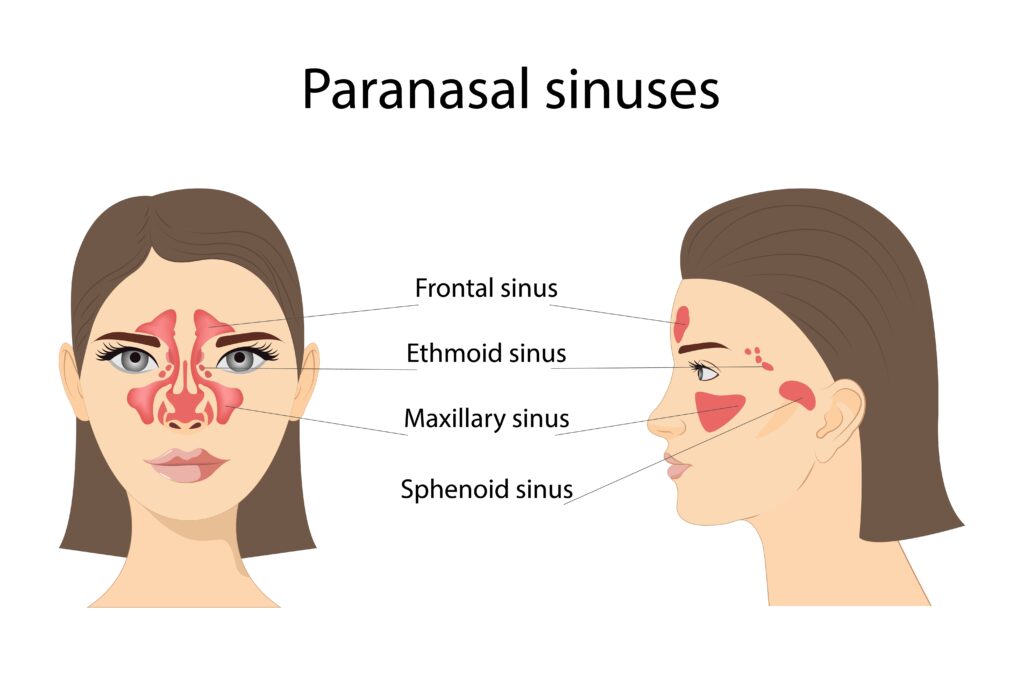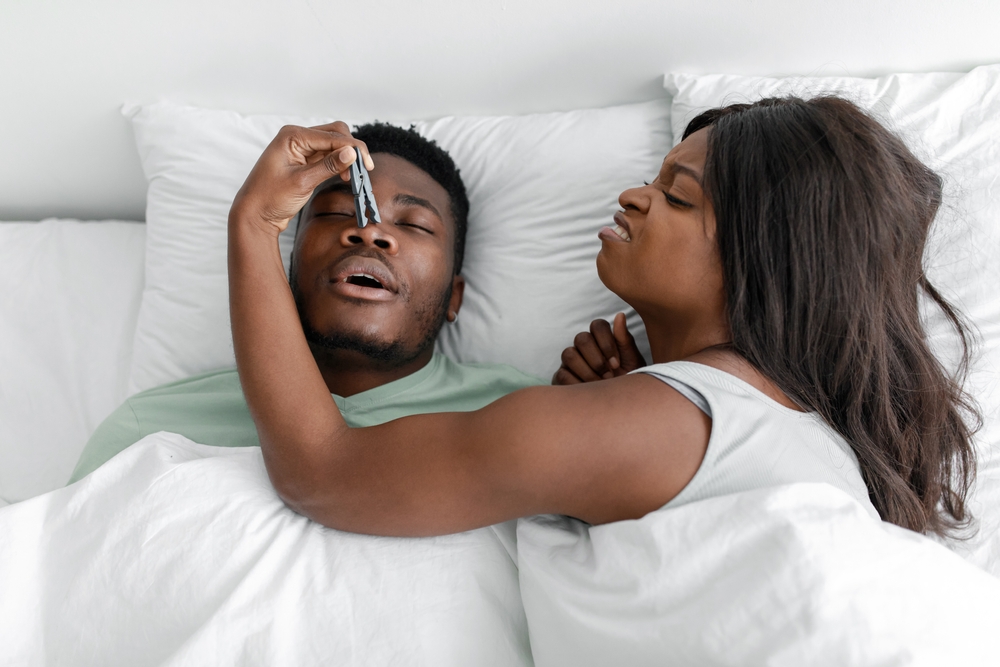Posted by: Maryland ENT in General
Do you snore loudly and often? A sinus problem could be to blame. Snoring now and then isn’t necessarily something to be bothered about.
But frequent snoring may be a tell-tale sign of a sinus issue that needs addressing. Knowing why you snore can ensure you receive the correct treatment for your snoring and sinus problem and a good night’s sleep every night.
Keep reading to learn more about sinuses, snoring, how snoring is linked to sinus problems, common sinus issues, and treatment options for sinus issues and snoring.
What are Sinuses, and How Do They Work?

Sinuses are a network of hollow, air-filled spaces or cavities in your head. Each sinus has an opening called an ostium that connects to your nasal passages. There are four pairs of sinuses found:
- Behind your nose
- Between your eyes
- In your cheekbones
- In the center of your forehead
Sinuses produce a thin layer of mucus that lubricates the sinuses and nasal passages. The mucus also protects against infection.
It traps pathogens and pollutants, such as allergens, bacteria, viruses, dust, and dirt. The mucus then flows through your sinuses and drains into your nasal passages via the ostia and down the back of your throat.
What is Snoring?
Snoring is the rumbling, rattling, grunting, or snorting sound made when your airway is obstructed or constricted. When you breathe through a narrowed or blocked airway while sleeping, airflow becomes disrupted.
Disrupting the airflow causes the upper airway tissues to flutter or vibrate, which produces the snoring sound. Almost everyone snores occasionally.
Snoring is usually nothing to worry about, but it may disrupt your partner or others in your household while sleeping in the evening. However, snoring can be a persistent problem for some people and point to an underlying health condition.
What are Sinus Problems?
Sinus issues occur when your sinuses become inflamed or infected, causing blockages, discomfort, and pain. The inflammation can be a result of various factors, including:
- Sinusitis
- Nasal polyps
- Allergic rhinitis
- A deviated septum
If your sinuses are inflamed or swollen, it becomes more difficult to breathe through your nose. You may also experience facial pain or pressure, coughing, congestion, and post-nasal drip.
When Does Snoring Become a Sinus Problem?

Snoring and sinus issues are related. Even though not everyone who snores has a sinus problem, many people with sinus issues tend to snore a lot.
For instance, sinus problems, such as a misshapen septum and small growths inside the nasal passages, are common causes of snoring. Moreover, nasal congestion, a key symptom of sinus issues, can lead to snoring in several ways, including:
Mouth Breathing
During sleep, you instinctively breathe through your nose. But if your nose is too stuffy or congested because of sinus problems, you may switch to mouth breathing.
Mouth breathing can cause the soft structures at the back of your mouth, like the soft palate and uvula, to vibrate, leading to snoring.
Nasal Congestion
Nasal congestion can cause your nasal passages to become partially blocked. Restricted nasal passages can prevent the smooth flow of air, resulting in snoring.
Common Sinus Problems
Several sinus problems can keep you from breathing comfortably and trigger snoring, including:
A Deviated Septum
One common cause of snoring is a deviated septum. The septum is the thin wall of cartilage, bone, and tissue dividing your left and right nostrils. A deviated septum happens when the wall is off-center or displaced, making one nostril or nasal passage smaller.
You can be born with a deviated septum. An injury, previous surgery, aging, certain medical conditions, or growths can also cause it.
A severely deviated septum can block one side of your nose and decrease airflow, causing trouble breathing out of one or both nostrils and, in turn, snoring.
Sinusitis
Sinusitis, or a sinus infection, is the inflammation or swelling of your sinuses. Bacteria, viruses, or fungi can cause it.
When you have sinusitis, you may experience congestion, and your breathing can become much louder. You might also experience post-nasal drip, which is mucus running into the back of your throat, irritating your airway and worsening your snoring.
Allergic Rhinitis

Hay fever or allergic rhinitis happens when your immune system overreacts to a substance in the environment that is harmless to most people. These substances are called allergens.
Common allergens include pollen, mold, dust mites, and pet dander. Once you come into contact with an allergen, your nasal passages become irritated and inflamed.
The inflammation can block your nasal passages, making breathing harder and causing snoring while sleeping.
Nasal Polyps
Nasal polyps are painless growths that form inside your sinuses and nose. They can develop in response to long-term inflammation from chronic sinusitis or nasal allergies.
Small polyps are not a cause for concern. Problems occur when they grow and become big enough to block your nose. Large polyps can make it more challenging to breathe through your nose, contributing to snoring.
Treatment Options for Sinus Problems and Snoring
Often, treating your sinus problems will dramatically reduce or eliminate snoring. Your treatment at Maryland ENT will be based on various factors, such as what’s causing your sinus issue and how long it’s lasted. It can include:
Oral Antibiotics
If your bacterial sinus infection has not improved after ten days, your ENT specialist at Maryland ENT can prescribe antibiotics. Finishing your course of antibiotics can also reduce nasal congestion and snoring.
Nasal Sprays
These sprays can reduce inflammation, encouraging mucus to drain from your nasal passages. Decreasing inflammation and improving drainage can relieve your symptoms, including congestion and snoring.
Nasal Saline Rinses
A saline rinse (water and sodium chloride) involves using an irrigation device such as a rinse bottle or neti pot. These devices push the sterilized salt water solution through one of your nostrils and out the other.
This action flushes out allergens, mucus, and pathogens, such as viruses and bacteria, from your nasal passages. Washing away these irritants relieves nasal congestion, snoring, and other bothersome symptoms.
Oral Steroids
In severe cases, your ENT specialist may prescribe a short course of oral steroids. Steroids help with allergies, shrink nasal polyps, and reduce swelling.
This opens your sinuses, improving your breathing and snoring.
Balloon Sinuplasty
If you suffer from recurring sinus problems, your ENT specialist at Maryland ENT may recommend balloon sinuplasty. This minimally invasive and highly effective procedure is an outpatient procedure, meaning you’ll go home after it’s over.
During the procedure, your ENT specialist will use an endoscope to guide a balloon catheter through your nostril and into the affected sinuses. The endoscope is a thin tube with a camera and light attached.
Once correctly positioned, your ENT specialist will slowly inflate the balloon to gently and permanently widen narrow or blocked sinuses. They will then deflate and remove the balloon.
Your ENT specialist will finally clean your sinuses with a saline solution. Balloon sinuplasty allows your sinuses to drain better. Enlarging and clearing your sinuses makes it easier for you to breathe and reduces or eliminates snoring.
Endoscopic Sinus Surgery
Your ENT specialist may recommend endoscopic sinus surgery if you have sinus problems like a deviated septum, chronic sinusitis, or nasal polyps that don’t respond to other treatments. The procedure involves inserting an endoscope into your nasal passages, which allows your surgeon to see and access your sinuses easily.
Depending on the source of your sinus problem, your surgeon will use specialized tools to straighten a deviated septum or remove obstructions like inflamed tissue or polyps. After endoscopic sinus surgery, you’ll experience fewer sinus issues, breathe more easily, and snore less.
Find a Long-Term Solution for Your Snoring
If you’re struggling with snoring, Maryland ENT can help. Our experienced ENT specialists will provide the most effective treatment for your snoring and sinus problems, allowing you to breathe easier and improve your sleep habits.
Do you suspect that your snoring is linked to a sinus problem? Schedule your appointment today at Maryland ENT in Lutherville and Baltimore, MD, to determine what’s causing your discomfort. Why wait any longer to feel better?



